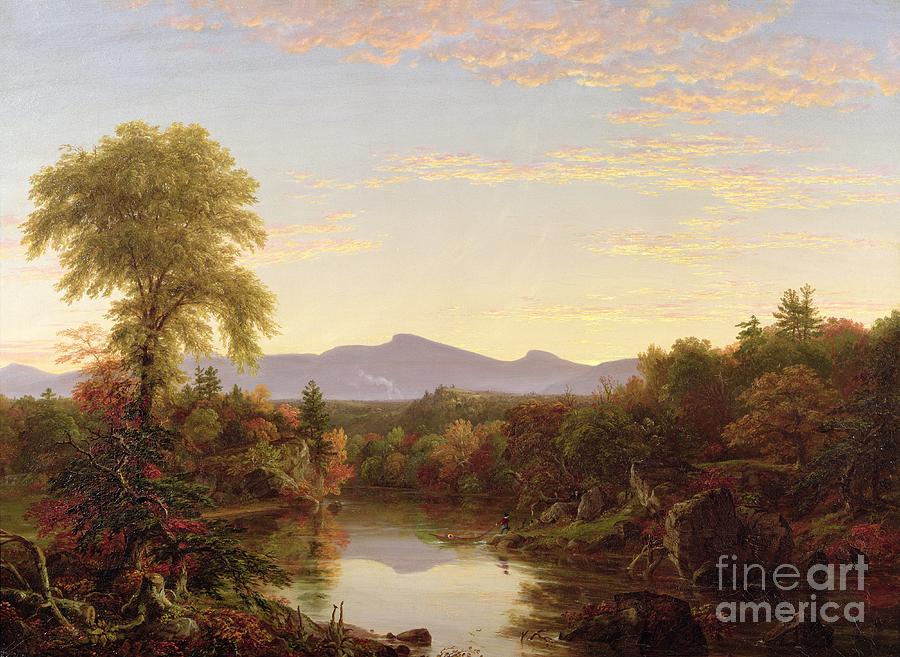Worcester
Art Museum
September 8 through November 25 July 26, 2018
A stunning array of over 40 paintings from
the New - York Historical Society’s
collection by renowned Hudson River School artists, including Thomas Cole, Asher B.
Durand, Albert Bierstadt, Jasper Cropsey,
John F. Kensett, and William T. Richards, will be on view at the Worcester Art Museum from September 8 through
November 25, 2018. Painted between 1818
and 1886, the works illustrate America’s scenic splendor as seen through the eyes of some of the country’s most
important painters.
In the first decade of the 19th century, the expansive
landscapes of the Hudson River Valley
and adjacent areas, such as the Catskills and the Adirondack Mountains, inspired an elite group
of American artists known as the Hudson
River School. Coming together under the influence of British émigré painter Thomas Cole (1801 – 1848), they shared
a philosophy and appreciation for the
natural landscape. Today their collective works are considered the first uniquely American art movement. In their
idyllic depic tions of the landscape, these
artists conveyed not only the majesty of America, but an image of man living in harmonious balance with nature.
The Poetry of Nature: Hudson River School Landscapes from the New - York Historical Society opens with seminal works by Thomas Cole and Asher B. Durand (1796 – 1886). Cole first traveled up the Hudson in 1825, where he captured the wildness of the American landscape in his paintings. Durand, who frequently worked alongside Cole, was instrumental in leading the group after the latter’s untimely death in 1848.
Cole’s romantic interpretations of the American landscape — represented in the exhibition by his painting,

Catskill Creek, New York , depicting a tranquil sunset view on the Catskill Creek — demonstrate his mastery of perspective; he is able to convey vast open spaces and create rich atmospheric effects.
Durand favored tighter views and closely observed details of nature. Paintings in the exhibition will present his vivid compositions, from majestic mountain ranges to tranquil woodland interiors and studies of trees. Durand’s influential Letters on Landscape Painting (1855 – 1856), promoted the movement for plein air painting, calling such excursions, “hard - work - play.” As president of the National Academy of Design, he advocate d for the landscape paintings by his Hudson River School colleagues at that institution and facilitated the patronage and rise of the Hudson River School.
Coinciding with an increase in leisure travel, the Hudson River painters also journeyed to regions no ted for their beauty outside of New York State. New Hampshire, coastal New England, and even the mountains of Virginia were among the areas featured in their works.
The exhibition was organized by the New - York Historical Society, which holds one of the mo st renowned collections of Hudson River School paintings. Dr. Linda S. Ferber, the museum director emerita of New - York Historical and a leading authority on Hudson River School artists, is the curator for this extraordinary exhibition.
The Poetry of Nature: Hudson River School Landscapes from the New - York Historical Society opens with seminal works by Thomas Cole and Asher B. Durand (1796 – 1886). Cole first traveled up the Hudson in 1825, where he captured the wildness of the American landscape in his paintings. Durand, who frequently worked alongside Cole, was instrumental in leading the group after the latter’s untimely death in 1848.
Cole’s romantic interpretations of the American landscape — represented in the exhibition by his painting,

Catskill Creek, New York , depicting a tranquil sunset view on the Catskill Creek — demonstrate his mastery of perspective; he is able to convey vast open spaces and create rich atmospheric effects.
Durand favored tighter views and closely observed details of nature. Paintings in the exhibition will present his vivid compositions, from majestic mountain ranges to tranquil woodland interiors and studies of trees. Durand’s influential Letters on Landscape Painting (1855 – 1856), promoted the movement for plein air painting, calling such excursions, “hard - work - play.” As president of the National Academy of Design, he advocate d for the landscape paintings by his Hudson River School colleagues at that institution and facilitated the patronage and rise of the Hudson River School.
Coinciding with an increase in leisure travel, the Hudson River painters also journeyed to regions no ted for their beauty outside of New York State. New Hampshire, coastal New England, and even the mountains of Virginia were among the areas featured in their works.
The exhibition was organized by the New - York Historical Society, which holds one of the mo st renowned collections of Hudson River School paintings. Dr. Linda S. Ferber, the museum director emerita of New - York Historical and a leading authority on Hudson River School artists, is the curator for this extraordinary exhibition.
Albert Bierstadt, Autumn Woods, 1886.(New-York Historical Society
![Niagara Falls (1818) by Louisa Davis Minot. Oil on linen, 76.2 × 103.2 cm; Gift of Mrs. Waldron Phoenix Belknap, Sr., to the Waldron Phoenix Belknap, Jr., Collection. Collection of the New-York Historical Society, Object 156.4. In the early 19th century, Niagara Falls was considered the epitome of the overwhelming sublime, but the tourists walking the rocks clad in fine suits or dresses indicates this landscape was already tamed and accessible [21]. Image © The New-York Historical Society. Reproduction of any kind is prohibited without express written permission in advance from The New-York Historical Society.](https://www.researchgate.net/publication/307840044/figure/fig4/AS:404090648580101@1473354126982/Niagara-Falls-1818-by-Louisa-Davis-Minot-Oil-on-linen-762-1032-cm-Gift-of-Mrs.png)
